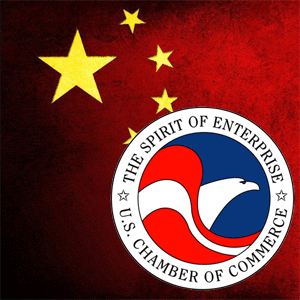 NEWS
NEWS
 NEWS
NEWS
 NEWS
NEWS
![]() Lots of attention has been directed at hackers possibly working out of China and the report of a year-old breach of the U.S. government connected to the country is only fanning the flames of that attention.
Lots of attention has been directed at hackers possibly working out of China and the report of a year-old breach of the U.S. government connected to the country is only fanning the flames of that attention.
The Wall Street Journal is reporting about an event that took place back in May 2010 when hackers breached the defenses of the U.S. Chamber of Commerce and pilfered communications data from their servers. The operation involved at least 300 Internet addresses and may have compromised the information of almost three million members; security experts working for the U.S. government used an expected lull in hacker activity to clean up the breach over a weekend.
Little information is known on how much data was copied by the hackers but experts looking over the systems revealed evidence that the hackers focused on four employees who worked on Asian policy and had taken six weeks of e-mail communication. It’s also noted that the hackers may have had access to the systems for more than a year before they had been discovered.
The Chinese angle arises when one of the sources for The Wall Street Journal mentioned that they suspected that the hacker group had based themselves in China—and had strong ties to the Chinese government. According to the same source, the FBI had informed the Chamber that a group of servers in China were stealing their information; however, the FBI declined to comment.
Due to the rise of attention directed at China in terms of cyberwarfare and discovery. Chinese diplomats are rightfully concerned that people might view these activities as the nation encouraging hacking. Officials from China have roundly denied any part of hacking and continue to point out that hacking is illegal in China with some extreme penalties.
Spokesman Geng Shuang mentioned that China itself is the victim of cyberattacks—as any country with information on the Internet is—and that the allegation that the attack on the U.S. Chamber of Commercse had any connections to China lacked proof or evidence. He also added that the hacking issue shouldn’t be “politicized.”
China is starting to feel the burn as more and more cyberattacks seem to originate within their borders or are tied back to their government. Starting with investigations into the now-infamous Cyber Rat hacking campaign, China has appeared on the radar and burned brightly with numerous rumors flying about the country’s involvement in numerous cyberops against a number of Internet-connected nations. China has seen themselves implicated in attacks on South Korea, the hacking of Japanese parliament workers, the compromise of a NASA satellite years ago, and even spear-phishing Trojans directed at defense contractors who work on chemical weapons.
If all that wasn’t enough, China has been accused by RSA as being responsible or involved with the groups behind the breach of their SecurID cryptographic key service back in March 2011.
China is probably feeling extremely sensitive about hacking accusations at the moment as sentiment about their involvement in these attacks against numerous nations mount.
So far there’s little evidence that the Chinese government itself has been involved in the attacks; however, Chinese IP addresses are obviously a favorite for high-profile hacks. Numerous possibilities reveal themselves amid them the actual involvement of official Chinese sanctioned hacking, but also rogue criminal elements working out of China or using Chinese servers as staging points for outgoing attacks. Due to the xenophobic nature of the Chinese government’s foreign policy, the country is a good place for hackers to origin from as it’s unlikely the target governments (outside of China) will ever hear the results of internal discovery and investigatons.
Support our mission to keep content open and free by engaging with theCUBE community. Join theCUBE’s Alumni Trust Network, where technology leaders connect, share intelligence and create opportunities.
Founded by tech visionaries John Furrier and Dave Vellante, SiliconANGLE Media has built a dynamic ecosystem of industry-leading digital media brands that reach 15+ million elite tech professionals. Our new proprietary theCUBE AI Video Cloud is breaking ground in audience interaction, leveraging theCUBEai.com neural network to help technology companies make data-driven decisions and stay at the forefront of industry conversations.